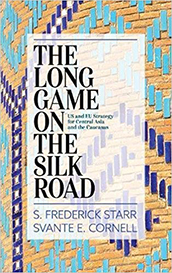U.S. Strategy Towards Afghanistan And (The Rest Of) Central Asia
President Trump and his isolationist backers may think otherwise, but there is no real alternative to continued involvement.
President Trump and his isolationist backers may think otherwise, but there is no real alternative to continued involvement.
As Central Asians seek to design structures of cooperation that fit their needs, they should certainly build on the achievements of the late 1990s.
Uzbekistan, long considered the center of Central Asia, has the region’s largest population and borders every other regional state including Afghanistan.

This book argues that American and European policies toward Central Asia and the Caucasus suffer from both conceptual and structural impediments.
With respect to Afghanistan, the United States, Europe, Japan, South Korea and the major international financial institutions are all caught in a time warp. Dating back a century and a half, this distortion today impedes Afghanistan's development as a normal country. No less, it helps isolate the other countries of Central Asia from a nearby major market, the Indian subcontinent and Southeast Asia, and pushes the other countries of Central Asia into a one-sided relationship with their former imperial overlord, Russia. It's time to correct this long-standing mistake.